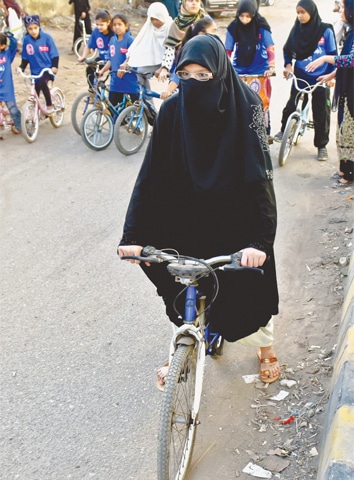
“THE gang war wreaked havoc in our lives — it took our men, livelihoods, and destroyed generations of Kutchi and Baloch families,” says Kiran Usman, an NGO worker from Lyari. “But most of all, it scared our women. They did not want to step out of the house, in fact, they couldn’t.”
She explains that it was to fight this fear that she teamed up with the Aas Research and Development Organisation (Arado), a non-governmental organisation (where she now works as a project manager), to launch the Lyari Girls’ Cafe.
The cafe opened its doors last year and is currently located on the ground floor and rooftop of a building on the tightly packed Shah Abdul Latif Bhitai Road in Kalri — previously the stronghold of gang war leader Baba Ladla, who was allegedly killed a few years ago.
With more than 250 girls coming to the cafe every day, Kiran and her colleagues are teaching them all sorts of skills, from articulation and writing, to using a computer, applying mehndi, and doing hair and makeup.
“It has been a difficult journey,” Kiran tells Dawn. “We have many young girls and women come here because we provide them with a safe environment. I think it is a testament to what we do that even single mothers come here to learn some skills in order to help provide for their children.”
Her colleague Rimsha shares that her father left her mother more than three years ago, and this made her want to prove that they could survive without a man.
“I started teaching language here a while ago,” she says. “I’m the only girl in my family who works or has been to school. At first my family was very annoyed. My uncle kept asking why I wanted to work — and, are you going to get a real job? Will your husband let you step out of the house? But now they understand,” she says with satisfaction, adding that in the next eight years she hopes to make it to the University of Oxford like Malala Yousufzai.
Talking about the women she has worked with, Rimsha explains that it was hard to find a consistent response. “I had a student, Hafeeza, who left in the middle of class because her brothers did not want her to study or socialise outside the house. Parveen, a single mother who is in my class, skips many because of the same reason. She comes when she is sure her brothers won’t find out. These men think that a woman’s place is in the kitchen. No one cares about what a woman wants or about her dreams and ambitions. It’s just about marriage, the kitchen, and reproduction,” she says.
Recently, the women had to join forces and face yet another problem. As part of their cafe’s activities, they had started a cycling group activity for women in the neighbourhood. Since the streets in their area were too congested, they decided to go to another area, an Afghan neighbourhood, near Masjid Road. On Wednesday, the girls went out on their bicycles when boys from a nearby seminary came running outside.
“They harassed our girls,” says Sassi, a project coordinator. “They were shouting, swearing, throwing things — they wanted to scare us away. When we complained to the local nazim, he said that it was his area and we should not interfere or ever go there again. He threatened to force the cleric to issue a fatwa against us during the Friday sermons.”
Since the nazim and the seminary management was not willing to listen, Sassi, Kiran and Rimsha decided on the only course of action that made sense to them — contact the Rangers.
They arrived the next day with 30 women and Rangers personnel. When they asked the nazim if he was willing to reconsider, he denied the incident had taken place and said that they could come and use the space whenever.
“In the evening we received a call from him again and he said, don’t come back. What was the issue, we asked? How are these teenagers offending you? It’s the only street in the area where the roads are not flooded with sewage,” they explain. “But he did not budge.”
However, the young women did not let this stop them. “If they won’t let us use their neighbourhood we will find another spot,” they say, adding that after a careful survey and discussion with the NGO’s president, they decided to check out the area near the Navy flats — towards the outer side of Lyari. On Friday, the girls went to check out the new location and it was just what they needed.
“People point fingers at us and say we are spreading feminism,” says Sassi. “But what’s wrong with that, it is not a disease. When talking about Lyari, people focus only on the men, gang war, decapitated heads — no one wants to talk about the women. We are trying to change that.”
Published in Dawn, February 6th, 2018
















































